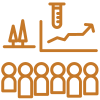Innovative Methods and Metrics for Agriculture and Nutrition Actions (IMMANA) is a research initiative led by the London School of Hygiene and Tropical Medicine in partnership with Tufts University and School of Oriental and African Studies (SOAS), University of London. IMMANA is coordinated by the Leverhulme Centre for Integrative Research on Agriculture and Health (LCIRAH) and is funded by the UK Department for International Development (DFID).
LCIRAH aims to accelerate the development of a robust and coherent scientific evidence base, which will underpin effective and cost-effective investments in agriculture-food systems for improved nutrition and health. LCIRAH was established in 2010 to build a new inter-sectoral and interdisciplinary platform for integrating research in agriculture and health, with a focus on international development goals. The Centre brings together researchers from the LSHTM, SOAS, Royal Veterinary College (RVC), and their partners, to develop research approaches and methodologies that integrate agricultural and health research.
LCIRAH sits within the London International Development Centre (LIDC), a multi-institutional initiative established to promote inter-institutional and interdisciplinary research focused on low and middle income countries.
Innovative Methods and Metrics for Agriculture and Nutrition Actions (IMMANA)
IMMANA’s objectives are to:
1. Stimulate the development of innovative methodological approaches and novel metrics in agriculture and food systems for improved health and nutrition;
2. Build a cadre of early-career researchers skilled in developing and applying cutting-edge methods and metrics;
3. Facilitate learning, sharing and new interdisciplinary research collaborations;
4. Develop scientific evidence to inform policies and investments in agriculture and food systems for improved nutrition and health.
The consultant will use IMMANA’s logical framework to address the key evaluation question: ‘Has IMMANA accelerated the development of a robust and coherent scientific evidence base which will underpin effective policy and investments in agriculture for improved nutrition and health?’ by looking at:
- Successes: achievements related with the objectives of IMMANA, as well as its expected outputs and outcomes; results, achievements or outcomes that came about as a result of the work, though not necessarily linked to expected outputs or outcomes.
- Challenges: obstacles encountered that hindered the achievements of objectives, expected outcomes and outputs, as well as strategies employed to overcome any such obstacles.
- Lessons Learnt: analysed over time, showcasing the programme’s evolution over time and the impact created. The consultant will bring key skills and experience to define evaluation questions and objectives and will be responsible for the developing an effective evaluation protocol. The evaluation questions and the evaluation protocol proposed by the evaluator will be reviewed by IMMANA, and will include a desk review of pertinent project documents and records (including the original project proposals, log frames, annual reports, activity reports, and various records containing monitoring data), in addition to data collection from partner organisations, such as through key informant interviews.
The Evaluator will play a leading role in shaping and improving our M&E and theories of change.
Primary objectives include:
- To develop IMMANA’s results-based monitoring and evaluation strategy. This will include reviewing IMMANA’s theory of change with risks and assumptions and thinking through indicators for outputs, outcomes (purpose) and impacts (goal) and the methods needed to collect ongoing data for the project deliverables, as well as building in mid-term assessments and post-project evaluations as appropriate;
- To help ensure that IMMANA meets the requirements for evaluations set out in our DFID grant agreement,
- To evaluate, against IMMANA programme framework, progress towards achievement of agreed targets and milestones, and to supervise regular data collection through implementing partners and ensure quality of the data by random verifications and validations;
- To conduct an independent evaluation of IMMANA, and to analyse and discuss findings.
For deliverables of the consultancy, qualification requirements and application instructions, see the attached pdf.
















